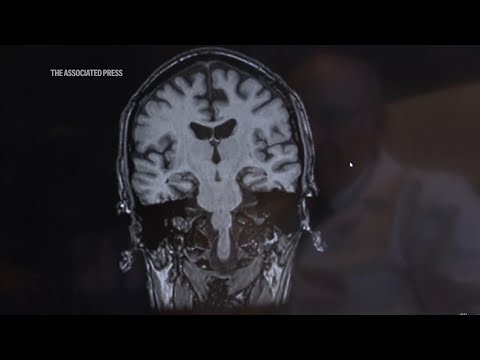(13 Jan 2025)
RESTRICTION SUMMARY:
++MUSIC CLEARED FOR GENERAL USE++
ASSOCIATED PRESS
London – 8 October 2018
1. Various close of computer monitor showing MRI scan showing deterioration and cell death of 62 year old Alzheimer’s patient over seven years
2. Close of PET scan of healthy brain (left) and Alzheimer’s patient’s brain (right) red areas show degeneration and cell death
ASSOCIATED PRESS
Boca Raton, Florida – 9 January 2025
3. SOUNDBITE (English) Dr. James Galvin, Professor of neurology at University of Miami:
"So it’s not a guarantee that someone will develop dementia."
ASSOCIATED PRESS
St. Louis – 29 September 2022
4. Close of scan of brain damaged by Alzheimer’s
ASSOCIATED PRESS
Boca Raton, Florida – 9 January 2025
++COVERED++
5. SOUNDBITE (English) Dr. James Galvin, Professor of neurology at University of Miami:
"We can take preventive measures and we can change our behaviors."
ASSOCIATED PRESS
New York – 22 October 2024
6. Various of people walking on path
ASSOCIATED PRESS
Boca Raton, Florida – 9 January 2025
++PART COVERED++
7. SOUNDBITE (English) Dr. James Galvin, Professor of neurology at University of Miami:
"So you exercise more, you’re more cognitively active, more mindful, eat a better diet, or you don’t have blood high blood pressure, you don’t have diabetes, you don’t have cholesterol, puts you at a lower risk of developing disease."
ASSOCIATED PRESS
ARCHIVE: Dates, locations unknown
8. Various tight shots of patients have blood pressure taken
STORYLINE:
A new study by NYU Langone Health reports there is a 4 in 10 chance of developing dementia after age 55 if people live long enough.
But that risk jumps in the later decades. Between ages 55 to 75, there’s just a 4% chance of cognitive trouble — a crucial window to guard brain health.
SOUNDBITE (English) Dr. James Galvin, Professor of neurology at University of Miami:
"So it’s not a guarantee that someone will develop dementia."
SOUNDBITE (English) Dr. James Galvin, Professor of neurology at University of Miami:
"We can take preventive measures and we can change our behaviors."
While some factors like genes and age can’t be changed, making some lifestyle changes can help.
SOUNDBITE (English) Dr. James Galvin, Professor of neurology at University of Miami:
"So you exercise more, you’re more cognitively active, more mindful, eat a better diet, or you don’t have blood high blood pressure, you don’t have diabetes, you don’t have cholesterol, puts you at a lower risk of developing disease."
===========================================================
Clients are reminded to adhere to all listed restrictions and to check the terms of their licence agreements. For further assistance, please contact the AP Archive on: Tel +44(0)2074827482 Email: info@aparchive.com.
Find out more about AP Archive: http://www.aparchive.com/HowWeWork
Twitter: https://twitter.com/AP_Archive
Facebook: https://www.facebook.com/APArchives
Instagram: https://www.instagram.com/APNews/
You can license this story through AP Archive: http://www.aparchive.com/metadata/youtube/d3f8816b13c049b0b1e748b260f90c9e
Author: AP Archive
Go to Source
News post in January 18, 2025, 6:05 pm.
Visit Our Sponsor’s:
News Post In – News





